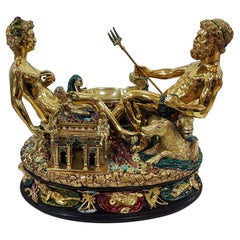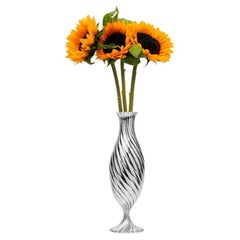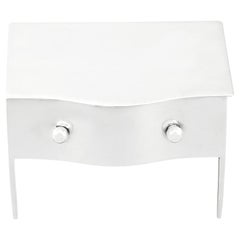Argenterie di Milano Figurative Sculptures
to
1
1
1
1
1
1
1
1
1
Height
to
Width
to
1
1
1
12
154
152
141
112
Creator: Argenterie di Milano
20th Century Italian Silver 800 and Ebony "Benvenuto Cellini Salt Cellar"Replica
By Argenterie di Milano
Located in VALENZA, IT
Fantastic reproduction of the famous saltcellar of Benvenuto Cellini, symbol of the world goldsmith's art.
The master goldsmith made only very few copies of this wonderful object that makes it a unique piece in the world.
6.641 grams of solid silver.
Some information on the original piece by Benvenuto Cellini:
The Cellini Salt...
Category
1980s Italian Renaissance Vintage Argenterie di Milano Figurative Sculptures
Materials
Silver
Related Items
20th Century Italian 925 Sterling Silver Torsade Vase by Mario Buccellati
By Mario Buccellati
Located in Braintree, GB
20th Century Italian 925 sterling silver torsade vase by Mario Buccellati
Made in Italy, 20th Century.
Maker: Mario Buccellati
Fully hallmarked.
Mario Buccellati was born int...
Category
20th Century Italian Argenterie di Milano Figurative Sculptures
Materials
Sterling Silver
$11,527
H 12.8 in Dm 3.94 in
20th Century Edwardian Sterling Silver Jewelry Box
By A&J Zimmerman Ltd.
Located in Jesmond, Newcastle Upon Tyne
An exceptional, fine and impressive antique Edwardian English sterling silver jewelry box; an addition to the ornamental silverware collection
This exceptional antique silver jewelry box, in sterling standard, has been modelled in the form of a dressing table.
The surface of this Edwardian jewelry box is plain and embellished with two applied sterling silver balls to the anterior convex arched surface, replicating the details of the draw handles.
The original hallmarked hinged cover is plain and parallels the shape of the body, opening to reveal the original segmented velvet interior.
The weighted base of this exceptional antique box retains the original leatherette covering to the underside.
The box is supported by four subtly tapering pillar style legs
Note: The majority of such boxes have a wood lining to the interior; it is a sign of quality when boxes have unlined interiors in addition to a solid silver cover.
Condition
This antique silver box is an exceptional gauge of silver, exceptional quality and in exceptional presentation condition.
The box has been professionally polished and is in presentation condition.
The original interior and leatherette covering have wear in keeping with age and use.
Full hallmarks struck to the surface of the body and part hallmarks to the interior of the cover are all very clear.
Reflections in photographs may detract from the true representation of this piece of antique Edwardian jewelry...
Category
Early 1900s English Edwardian Antique Argenterie di Milano Figurative Sculptures
Materials
Silver, Sterling Silver
Mario Buccellati, a Rare and Exceptional Italian Silver Goat
By Mario Buccellati
Located in Queens, NY
Mario Buccellati, a rare and exceptional Italian silver goat
circa 1940.
Made in Milan Italy.
Very fine quality and workmanship and very large in size.
Measures: 12" high x 14" w...
Category
20th Century Italian Argenterie di Milano Figurative Sculptures
Materials
Silver
Modern 20th Century Sterling Silver Watering Can - London 1991
Located in London, London
Hallmarked in London in 1991 by Whitehill Silver & Plate Company, this attractive, Sterling Silver Watering Can, would make an ideal piece...
Category
1990s English Modern Argenterie di Milano Figurative Sculptures
Materials
Sterling Silver
1950s Ebony Elephant, 20th Century
Located in Madrid, ES
1950s EBONY ELEPHANT
DECORATIVE ELEPHANT FROM THE 50'S IN EBONY AND BONE . MEASURES: 28 CM HIGH
good condition.
Category
20th Century Italian Baroque Argenterie di Milano Figurative Sculptures
Materials
Bone
1930's Mario Buccellati .800 Silver Italian Duckling Statue Figurine Italy
By Mario Buccellati
Located in San Diego, CA
Stunning vintage original Mario Buccellati Italian .800 silver furry duckling statue/figurine dating from the 1930's. Signed on the bottom of one foot. Made in Milano, Italy. Also ma...
Category
1930s Italian Vintage Argenterie di Milano Figurative Sculptures
Materials
Sterling Silver
$2,800 Sale Price
20% Off
H 2 in W 3 in D 2.25 in
Pair of 20th Century Silver Pheasants
Located in Los Angeles, CA
Pair of 800 silver pheasants. Gold vermeil. European (probably Austria).
Category
Early 20th Century Austrian Argenterie di Milano Figurative Sculptures
Materials
Silver
Gianmaria Buccellati, a Rare and Exceptional Italian Silver Bobcat
By Gianmaria Buccellati
Located in Queens, NY
Gianmaria Buccellati, a rare and exceptional Italian silver bobcat,
circa 1990s.
Made in Milan, Italy.
Retail price in the Buccellati Boutique was $72,000 USD + Tax.
Very fine qua...
Category
20th Century Italian Argenterie di Milano Figurative Sculptures
Materials
Silver
19th Century German Extremely Detailed Sterling Silver and Gold Gilt Knight
Located in North Miami, FL
19th Century German extremely detailed sterling silver and gold gilt knight figure. Knight in full suit of armour, carved face beneath a hinged viso...
Category
19th Century German Antique Argenterie di Milano Figurative Sculptures
Materials
Stone, Sterling Silver
$7,995
H 12 in W 4 in D 4 in
Attributed to Buccellati, 20th Century Sterling Silver Capercaillie
By Buccellati
Located in North Miami, FL
Presenting a remarkable 20th-century silver capercaillie sculpture, exquisitely attributed to the distinguished Buccellati workshop. This piece captures the essence of the capercaill...
Category
20th Century Italian Argenterie di Milano Figurative Sculptures
Materials
Stone, Sterling Silver
19th Century Italian Sterling Silver Madonna, circa 1830
Located in Milano, IT
Embossed and engraved silver plaque
La Madonna del lago (The Madonna of the Lake)
Probably Milan, post 1824
Brass frame
It measures 16.14 in x 13.85 in (41 x 35.2 cm) and it weighs 10.357 pounds (4.698 g): silver 1.31 pounds (598 g) + brass 9.03 pounds (4.100 g)
State of conservation: some abrasions on the bottom. The frame is old, but not original.
The plaque is made up of a sheet of embossed and engraved silver, and held in a solid brass frame. It depicts the “Madonna del lago” – “Madonna of the Lake” - (the Madonna with Child and San Giovannino) by Marco d'Oggiono (Oggiono, 1474 circa - Milan, 1524 circa), while changing only the background landscape. Almost certainly the subject reproduced in the plaque was taken from a famous engraving by Giuseppe Longhi (Monza, 1766 - Milan, 1831), one of the greatest engravers of his era.
The silver is unmarked, probably because originally the Madonna was due to be exposed in a church: sometimes precious metals destined for worship and liturgical use would be exempted from payment and were, therefore, not marked.
It is very likely that the plaque was made in Milan because in this city in 1824 the engraving by Giuseppe Longhi was made and printed. In addition, in Milan, the alleged lost painting by Leonardo da Vinci in his Milanese period (1482-1500) would be produced; this is the painting from which Marco d'Oggiono took his version.
The painting
Marco d?Oggiono was one of Leonardo da Vinci's most brilliant students and collaborators (D. Sedini, Marco d’Oggiono, tradizione e rinnovamento in Lombardia tra Quattrocento e Cinquecento, Roma 1989, pp. 151-153, n. 56; p. 225, n. 124, with previous bibliography). His style reflects in every way that of the Tuscan Maestro, so much so that he was the one who executed some copies of da Vinci's paintings. The execution of the “Madonna del Lago” probably draws inspiration from a lost painting by the Maestro, created while he was living in Milan (1482-1500). There are many similarities with other works by Leonardo such as the “Vergine delle rocce” or the “Vergine con il Bambino e San Giovannino, Sant’Anna e l’Agnello”.
The painting, from which the drawing and then the famous engraving were taken, is found today at the M&G Museum of Bob Jones University in Greenville, South Carolina, where it came to rest after the sale of the Harrington Collection in London in 1917.
The work appears in the inventories of the collection of Napoleon and Joséphine Bonaparte at the castle of Malmaison, before 1809.
The Malmaison building was born and developed in the 17th and 18th centuries. In the 18th century it belonged to Jacques-Jean Le Coulteux du Molay, a wealthy banker. Later, during the Directory, Joséphine Bonaparte de Beauharnais bought it on April 21st, 1799, but settled at the castle definitively only after her husband separated from her in 1809. She remained there until 1814, the year of her death. When Joséphine died, the estate passed to her son Eugène de Beauharnais, who moved to Munich with his whole family in 1815, bringing with him the collection of paintings he inherited from his mother. Eugène died in 1824 and his wife Augusta of Bavaria (von Bayern), unable to keep it, in 1828 sold the Malmaison to the Swedish banker Jonas-Philip Hagerman.
It is likely that in this period Augusta also sold part of the paintings inherited from her husband, including the “Madonna del Lago”. This painting then came into the possession of Leicester Stanhope, fifth Earl of Harrington (1784 - 1862) and then was passed down to his descendants.
In 1917, at the death of Charles, eighth Earl of Harrington, his brother Dudley inherited the title and properties and he put up a part of his collections for sale. Among these, precisely, the painting by Marco d'Oggiono was to be found.
On the occasion of that auction the painting was presented as a work by Cesare da Sesto, by virtue of a handwritten note by the Countess of Harrington on the back of the table. However, already in 1857, the German critic Gustav Waagen had identified Marco d'Oggiono as the author of the painting, then exhibited in the dining room of Harrington House in London (Treasures of Art in Great Britain, in 4 volumes, London, 1854 and 1857).
The engraving
Giuseppe Longhi was one of the most renowned engravers in Italy between the end of the 18th century and the first quarter of the 19th century.
In 1824 Giuseppe Longhi, based on a design by Paolo Caronni, made a famous engraving of the painting of Marco d?Oggiono. The activity of Longhi was then at the peak of his notoriety, enough to earn him very substantial commissions; it is not risky to suppose that some of his successful engravings were also reproduced using other means: in our case in silver. (A. Crespi, a cura di, Giuseppe Longhi 1766–1831 e Raffaello Morghen...
Category
1820s Italian Neoclassical Antique Argenterie di Milano Figurative Sculptures
Materials
Sterling Silver, Brass
Hand-Painted Earthenware Figural Donkey Table Salt Cellar and Pepper Mill, Italy
Located in Bresso, Lombardy
Deruta (Perugia), Italy 1983.
This is a hand-painted earthenware donkey that can be used as a table salt cellar or just as a decorative object.
It is a vintage piece, therefore it m...
Category
1980s Italian Post-Modern Vintage Argenterie di Milano Figurative Sculptures
Materials
Earthenware
$576 Sale Price
25% Off
H 11.23 in W 10.24 in D 9.85 in
Argenterie Di Milano figurative sculptures for sale on 1stDibs.
Argenterie di Milano figurative sculptures are available for sale on 1stDibs. These distinctive items are frequently made of silver and are designed with extraordinary care. There are many options to choose from in our collection of Argenterie di Milano figurative sculptures, although brown editions of this piece are particularly popular. Prices for Argenterie di Milano figurative sculptures can differ depending upon size, time period and other attributes — on 1stDibs, these items begin at $154,850 and can go as high as $154,850, while a piece like these, on average, fetch $154,850.


